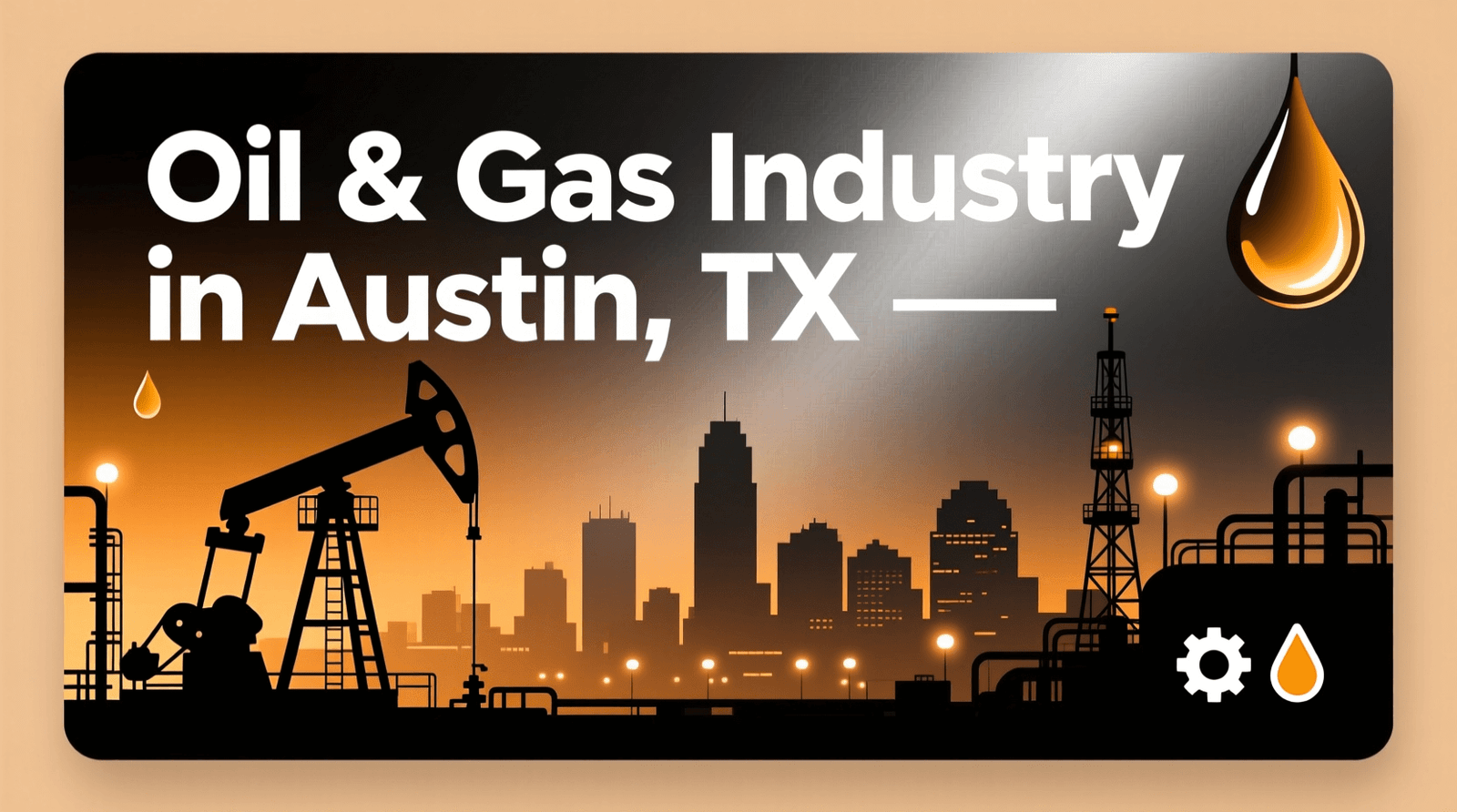Let’s squash the myth real quick: no, you won’t see pumpjacks dotting Barton Springs or drill rigs rolling down South Congress. Austin’s oil and gas scene ain’t about boots-and-hard-hat field ops—it’s the brains, the bytes, and the big-picture plays behind Texas energy. Think of Austin as the mission control for the Permian, Eagle Ford, and offshore Gulf: where geoscientists model reservoirs on 3D workstations, software devs build AI that predicts frac hits before the crew even shows up, and execs cut billion-dollar deals over brisket and black coffee.
Major players like ExxonMobil (with its massive North Austin campus—over 10,000 employees and counting), Shell, Chevron, BP, and ConocoPhillips all run huge corporate, tech, and analytics hubs right here. And it’s not just the supermajors—homegrown energy tech startups, midstream logistics firms, ESG compliance consultancies, and specialized engineering shops are thriving in the shadow of UT’s engineering buildings. With top-tier talent, killer infrastructure, and a business climate that doesn’t treat energy like a dirty word, Austin’s become the strategic nerve center for modern oil and gas—cleaner, smarter, and way more digital than your granddad’s derrick.
Why Austin? It’s the Sweet Spot Between Silicon Smarts and Texas Oil DNA
So why’d Big Oil park its brain trust in the Live Music Capital? Simple: Austin gives ’em the best of both worlds—Texas grit meets tech agility. First off, talent pipeline? Insane. UT Austin’s Cockrell School of Engineering cranks out world-class petroleum, mechanical, and data science grads—folks who can talk porosity and Python in the same sentence. Plus, veterans from Houston, Midland, and Odessa are relocating in droves for the schools, housing (still relatively sane), and no state income tax.
Second, infrastructure’s dialed: fiber everywhere (critical for real-time seismic streaming), reliable power (LCRA and Austin Energy work closely with industrial users), and logistics—Union Pacific rail, I-35 corridor access, and even Austin-Bergstrom handles oversized energy cargo. Third? Culture. Unlike older energy hubs stuck in legacy workflows, Austin-based teams expect innovation.
Want to pilot a drone-based flare monitoring system? Test ML algorithms on decades of well logs? Run a digital twin of a compressor station? Here, the answer’s usually “Hell yeah—let’s try it.” Throw in state incentives (hello, Texas Enterprise Fund), and it’s no shocker that Exxon basically built a city-within-a-city off US-183.
More Than Just HQs: The Full Energy Ecosystem Is Rocking Here
Sure, the corporate campuses get headlines—but Austin’s oil and gas muscle runs way deeper. You’ve got energy tech startups cooking up next-gen stuff: AI for predictive maintenance, methane leak detection via satellite + drone fusion, blockchain for royalty tracking, and even carbon capture analytics platforms. Then there’s specialized engineering & consulting firms—think reservoir modeling boutiques, HSE (Health, Safety, Environment) auditors who know OSHA and API standards inside-out, and cybersecurity teams protecting OT systems from ransomware.
On the supply chain side, local distributors provide everything from explosion-proof instrumentation to high-integrity Parker seals rated for sour service (H₂S won’t melt these). MRO isn’t just for jets anymore—Austin shops service downhole tooling, control valves, and gas analyzer systems.
And don’t sleep on the support services: legal firms fluent in mineral rights and JOAs, recruiters who know the difference between a completions engineer and a facilities lead, and even comms agencies that help E&P companies tell their ESG story without sounding like they’re greenwashing. Bottom line? If it helps find, produce, move, or optimize hydrocarbons—or manage the transition—there’s likely an Austin crew killing it.
Challenges? Yep—but Austin’s Playing the Long Game, Not Just the Boom-Bust Cycle
Let’s keep it real: energy’s a rollercoaster, and Austin’s not immune. When oil prices tank, hiring freezes hit—even at the tech-forward shops. Office vacancies uptown spiked post-2020 as remote work stuck, and yeah, competing with Silicon Valley for AI/ML talent can get pricey. Plus, while Austin loves energy, the local vibe leans green—so companies that only talk “drill, baby, drill” without addressing emissions or community impact? They’ll get side-eye. But here’s how Austin’s staying sharp:
- Diversification: Smart firms aren’t just oil & gas—they’re “energy” broadly. Think hydrogen blending, geothermal modeling, CCUS (carbon capture, utilization, storage) project design, and grid-scale battery integration.
- Upskilling: Partnerships with ACC and UT on micro-credentials—like “Data Analytics for Reservoir Engineers” or “ESG Reporting for Energy”—keep crews future-ready.
- Hybrid HQs: Many execs split time between Austin (strategy/tech) and Midland/Houston (ops), so decisions stay grounded in field reality.
And let’s be honest—Austin’s resilience comes from its culture. Energy folks here aren’t just punching clocks; they’re building careers, raising families, and investing in the community. That kind of loyalty? That’s how you ride out the dips.
FAQs:
Do I need field experience to work oil & gas in Austin?
Not always. Corporate roles—data science, finance, legal, software dev, ESG reporting—often want domain awareness, not boots-on-rig time. That said, field vets are gold for product management or field tech support—your real-world war stories help build better tools.
Are there still good-paying blue-collar jobs in Austin energy?
For sure—but they’re evolving. Think technician roles: instrumentation techs calibrating smart sensors, drone operators running flare inspections, or composites specialists repairing FRP piping. Certifications (like NACE, API 510/570) + tech-savvy = serious earning power.
Is Austin big on renewables within oil & gas?
Massive. Most majors here have dedicated low-carbon teams. Exxon’s Austin crew works on lithium extraction from brine, Shell’s got folks optimizing wind/solar for remote well sites, and startups are building software to track Scope 1–3 emissions across the value chain. It’s not “oil or green”—it’s oil and transition.
How do I break in without an engineering degree?
Start in support—GIS tech, procurement specialist, field data coordinator, or even technical sales (many vendors train top performers). ACC’s Petroleum Equipment & Services cert is a solid 6-month launchpad. Network like crazy at Austin Energy Professionals meetups.
What’s the commute like for energy jobs?
Most corporate/tech roles are north or northwest—Domain, Arboretum, or off 183. Avoid I-35 rush hour like a stuck BOP. Pro tip: lots of firms offer hybrid schedules (3 days office, 2 remote), so you’re not stuck in traffic daily.


